LAW205 Commercial Law: Analyzing Darwin Soil & Water Testing Pty Ltd
VerifiedAdded on 2023/06/12
|6
|1287
|109
Case Study
AI Summary
This case study examines the legal issues surrounding Darwin Soil and Water Testing Pty Ltd, focusing on the rights of Ravi, the former sole trader who became the company's sole shareholder and director, to recover money lent to the business. The analysis applies the doctrine of separate legal entity established in Salomon v A Salomon & Co Ltd and relevant sections of the Corporations Act 2001 (Cth), particularly concerning the administrator's role and the Deed of Company Arrangement (DOCA). The study concludes that Ravi, as a secured creditor, is entitled to recover his investment, and it outlines the distribution of assets between secured and unsecured creditors based on the company's financial status. Desklib offers a wealth of similar solved assignments and study resources for students.
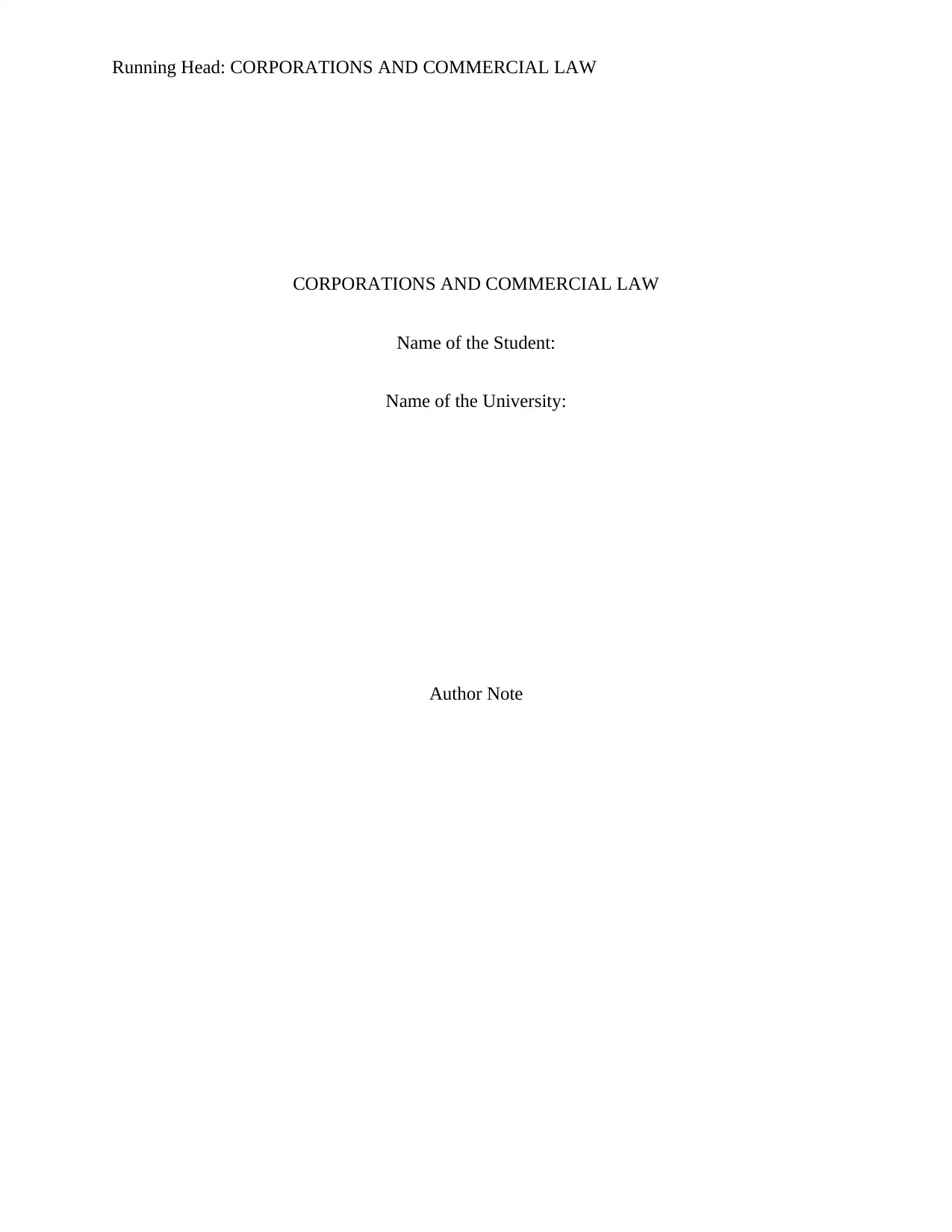
Running Head: CORPORATIONS AND COMMERCIAL LAW
CORPORATIONS AND COMMERCIAL LAW
Name of the Student:
Name of the University:
Author Note
CORPORATIONS AND COMMERCIAL LAW
Name of the Student:
Name of the University:
Author Note
Paraphrase This Document
Need a fresh take? Get an instant paraphrase of this document with our AI Paraphraser
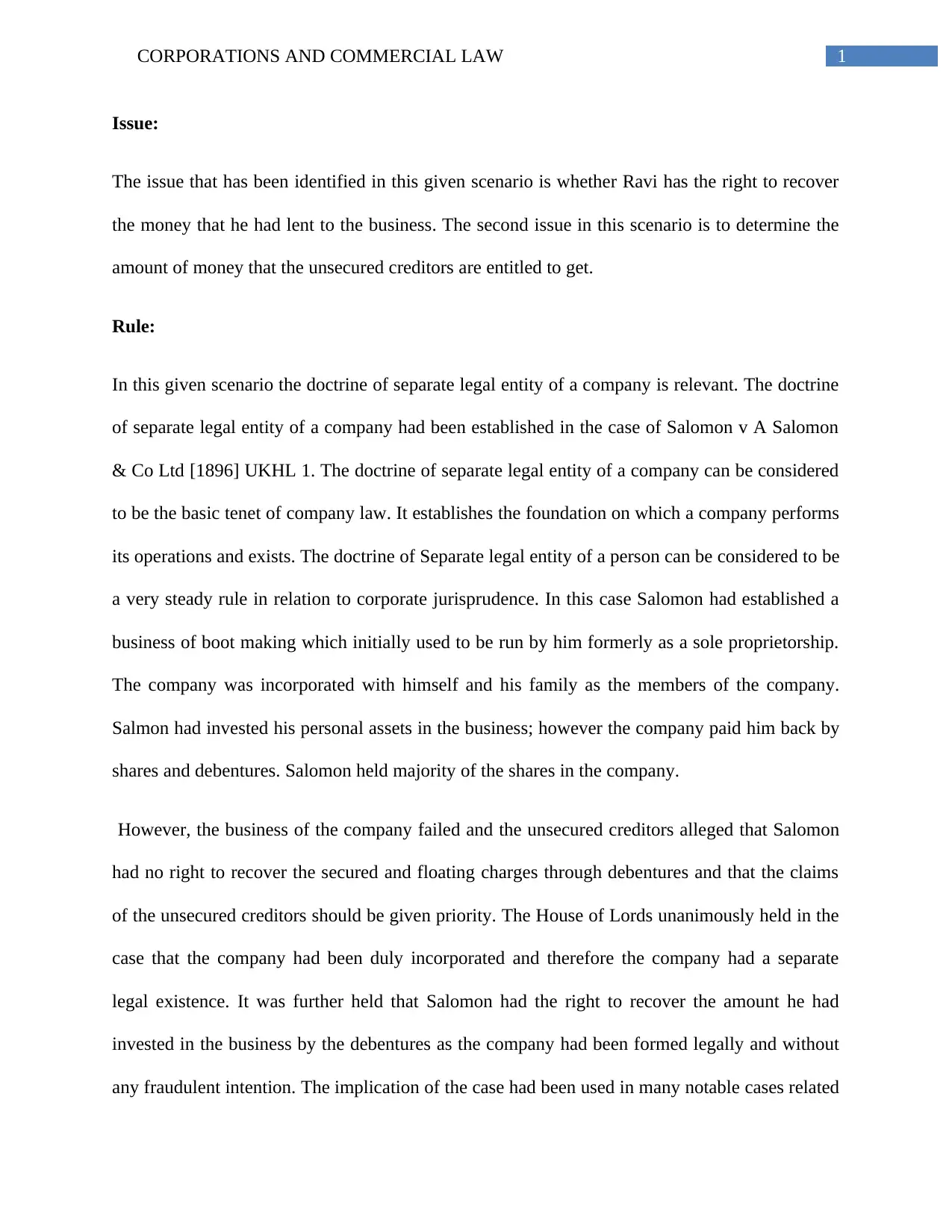
1CORPORATIONS AND COMMERCIAL LAW
Issue:
The issue that has been identified in this given scenario is whether Ravi has the right to recover
the money that he had lent to the business. The second issue in this scenario is to determine the
amount of money that the unsecured creditors are entitled to get.
Rule:
In this given scenario the doctrine of separate legal entity of a company is relevant. The doctrine
of separate legal entity of a company had been established in the case of Salomon v A Salomon
& Co Ltd [1896] UKHL 1. The doctrine of separate legal entity of a company can be considered
to be the basic tenet of company law. It establishes the foundation on which a company performs
its operations and exists. The doctrine of Separate legal entity of a person can be considered to be
a very steady rule in relation to corporate jurisprudence. In this case Salomon had established a
business of boot making which initially used to be run by him formerly as a sole proprietorship.
The company was incorporated with himself and his family as the members of the company.
Salmon had invested his personal assets in the business; however the company paid him back by
shares and debentures. Salomon held majority of the shares in the company.
However, the business of the company failed and the unsecured creditors alleged that Salomon
had no right to recover the secured and floating charges through debentures and that the claims
of the unsecured creditors should be given priority. The House of Lords unanimously held in the
case that the company had been duly incorporated and therefore the company had a separate
legal existence. It was further held that Salomon had the right to recover the amount he had
invested in the business by the debentures as the company had been formed legally and without
any fraudulent intention. The implication of the case had been used in many notable cases related
Issue:
The issue that has been identified in this given scenario is whether Ravi has the right to recover
the money that he had lent to the business. The second issue in this scenario is to determine the
amount of money that the unsecured creditors are entitled to get.
Rule:
In this given scenario the doctrine of separate legal entity of a company is relevant. The doctrine
of separate legal entity of a company had been established in the case of Salomon v A Salomon
& Co Ltd [1896] UKHL 1. The doctrine of separate legal entity of a company can be considered
to be the basic tenet of company law. It establishes the foundation on which a company performs
its operations and exists. The doctrine of Separate legal entity of a person can be considered to be
a very steady rule in relation to corporate jurisprudence. In this case Salomon had established a
business of boot making which initially used to be run by him formerly as a sole proprietorship.
The company was incorporated with himself and his family as the members of the company.
Salmon had invested his personal assets in the business; however the company paid him back by
shares and debentures. Salomon held majority of the shares in the company.
However, the business of the company failed and the unsecured creditors alleged that Salomon
had no right to recover the secured and floating charges through debentures and that the claims
of the unsecured creditors should be given priority. The House of Lords unanimously held in the
case that the company had been duly incorporated and therefore the company had a separate
legal existence. It was further held that Salomon had the right to recover the amount he had
invested in the business by the debentures as the company had been formed legally and without
any fraudulent intention. The implication of the case had been used in many notable cases related
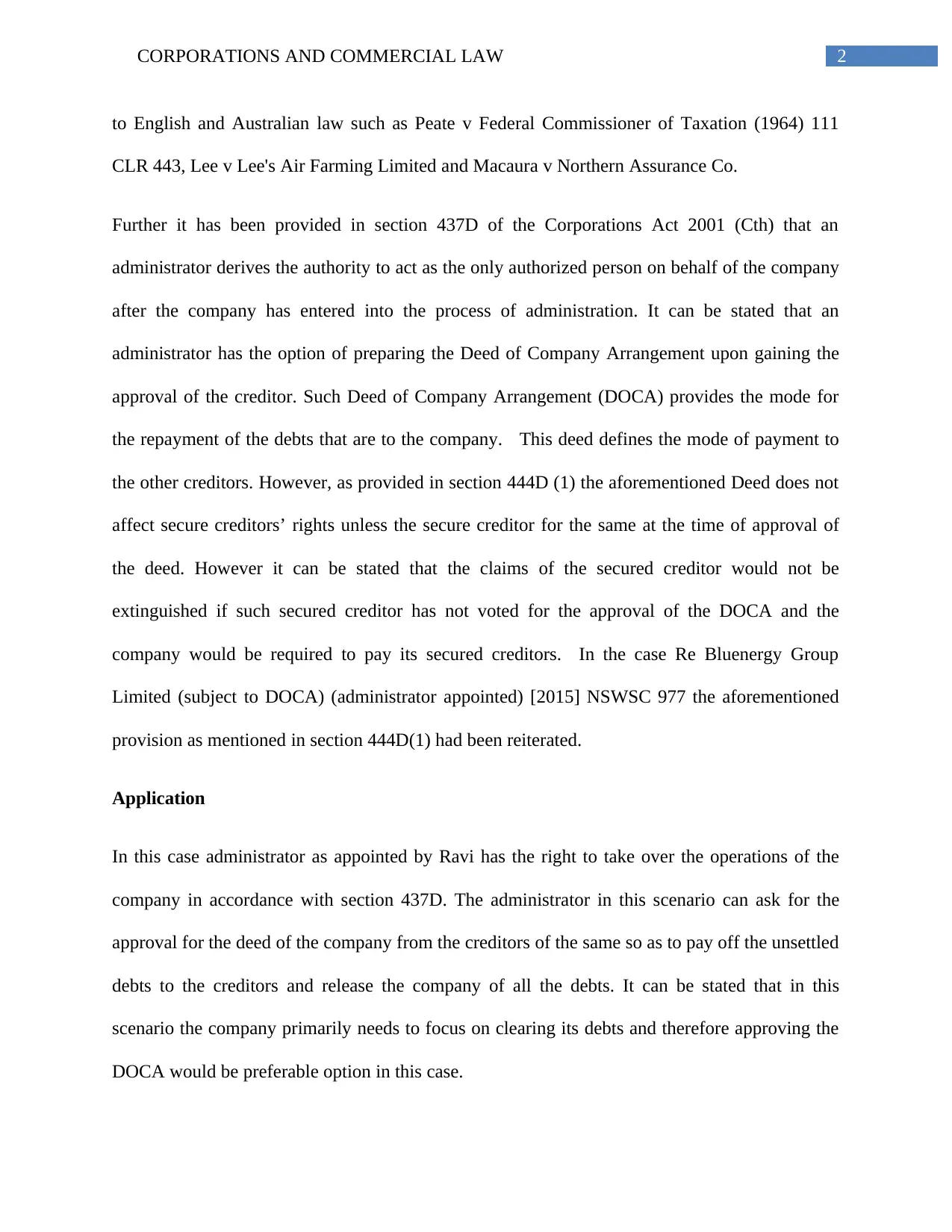
2CORPORATIONS AND COMMERCIAL LAW
to English and Australian law such as Peate v Federal Commissioner of Taxation (1964) 111
CLR 443, Lee v Lee's Air Farming Limited and Macaura v Northern Assurance Co.
Further it has been provided in section 437D of the Corporations Act 2001 (Cth) that an
administrator derives the authority to act as the only authorized person on behalf of the company
after the company has entered into the process of administration. It can be stated that an
administrator has the option of preparing the Deed of Company Arrangement upon gaining the
approval of the creditor. Such Deed of Company Arrangement (DOCA) provides the mode for
the repayment of the debts that are to the company. This deed defines the mode of payment to
the other creditors. However, as provided in section 444D (1) the aforementioned Deed does not
affect secure creditors’ rights unless the secure creditor for the same at the time of approval of
the deed. However it can be stated that the claims of the secured creditor would not be
extinguished if such secured creditor has not voted for the approval of the DOCA and the
company would be required to pay its secured creditors. In the case Re Bluenergy Group
Limited (subject to DOCA) (administrator appointed) [2015] NSWSC 977 the aforementioned
provision as mentioned in section 444D(1) had been reiterated.
Application
In this case administrator as appointed by Ravi has the right to take over the operations of the
company in accordance with section 437D. The administrator in this scenario can ask for the
approval for the deed of the company from the creditors of the same so as to pay off the unsettled
debts to the creditors and release the company of all the debts. It can be stated that in this
scenario the company primarily needs to focus on clearing its debts and therefore approving the
DOCA would be preferable option in this case.
to English and Australian law such as Peate v Federal Commissioner of Taxation (1964) 111
CLR 443, Lee v Lee's Air Farming Limited and Macaura v Northern Assurance Co.
Further it has been provided in section 437D of the Corporations Act 2001 (Cth) that an
administrator derives the authority to act as the only authorized person on behalf of the company
after the company has entered into the process of administration. It can be stated that an
administrator has the option of preparing the Deed of Company Arrangement upon gaining the
approval of the creditor. Such Deed of Company Arrangement (DOCA) provides the mode for
the repayment of the debts that are to the company. This deed defines the mode of payment to
the other creditors. However, as provided in section 444D (1) the aforementioned Deed does not
affect secure creditors’ rights unless the secure creditor for the same at the time of approval of
the deed. However it can be stated that the claims of the secured creditor would not be
extinguished if such secured creditor has not voted for the approval of the DOCA and the
company would be required to pay its secured creditors. In the case Re Bluenergy Group
Limited (subject to DOCA) (administrator appointed) [2015] NSWSC 977 the aforementioned
provision as mentioned in section 444D(1) had been reiterated.
Application
In this case administrator as appointed by Ravi has the right to take over the operations of the
company in accordance with section 437D. The administrator in this scenario can ask for the
approval for the deed of the company from the creditors of the same so as to pay off the unsettled
debts to the creditors and release the company of all the debts. It can be stated that in this
scenario the company primarily needs to focus on clearing its debts and therefore approving the
DOCA would be preferable option in this case.
⊘ This is a preview!⊘
Do you want full access?
Subscribe today to unlock all pages.

Trusted by 1+ million students worldwide
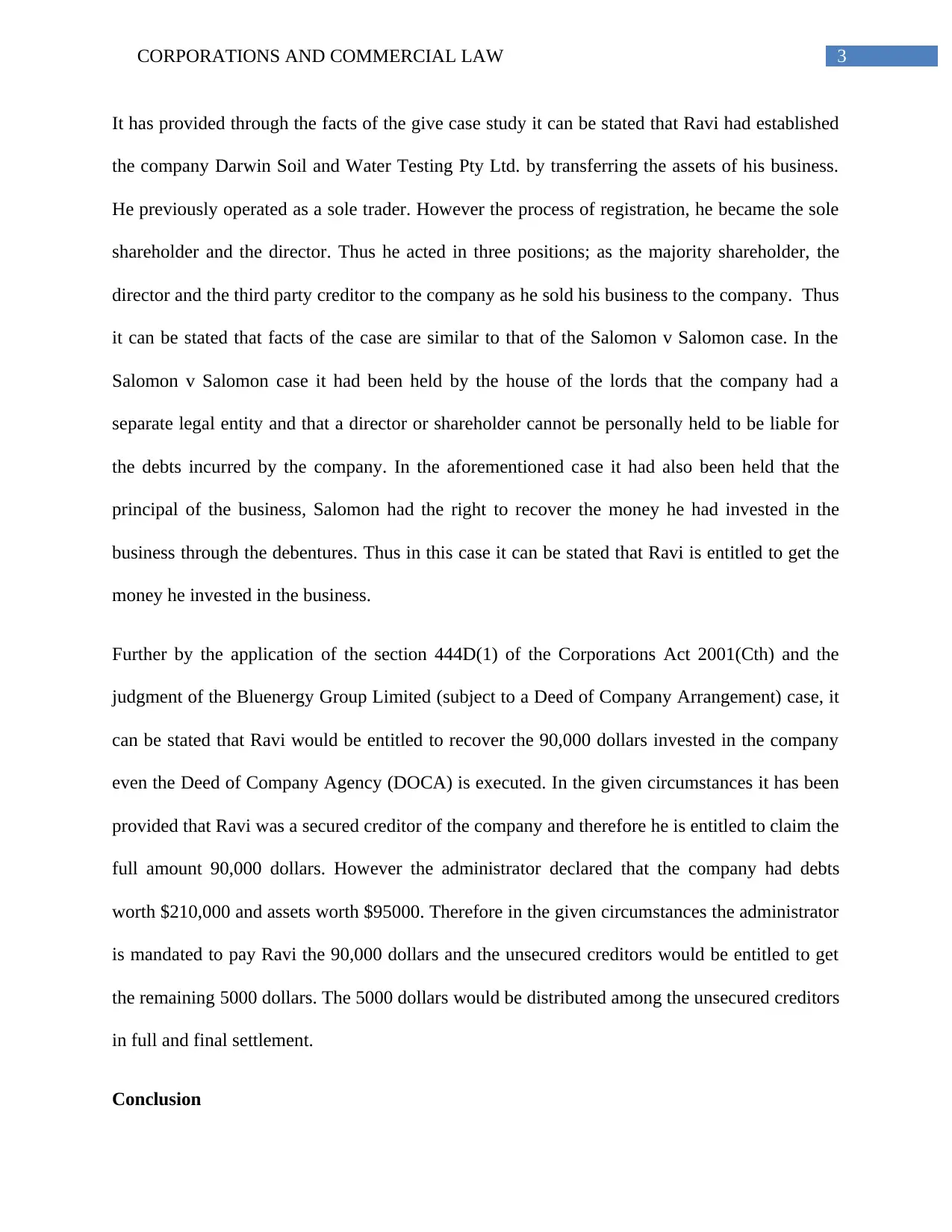
3CORPORATIONS AND COMMERCIAL LAW
It has provided through the facts of the give case study it can be stated that Ravi had established
the company Darwin Soil and Water Testing Pty Ltd. by transferring the assets of his business.
He previously operated as a sole trader. However the process of registration, he became the sole
shareholder and the director. Thus he acted in three positions; as the majority shareholder, the
director and the third party creditor to the company as he sold his business to the company. Thus
it can be stated that facts of the case are similar to that of the Salomon v Salomon case. In the
Salomon v Salomon case it had been held by the house of the lords that the company had a
separate legal entity and that a director or shareholder cannot be personally held to be liable for
the debts incurred by the company. In the aforementioned case it had also been held that the
principal of the business, Salomon had the right to recover the money he had invested in the
business through the debentures. Thus in this case it can be stated that Ravi is entitled to get the
money he invested in the business.
Further by the application of the section 444D(1) of the Corporations Act 2001(Cth) and the
judgment of the Bluenergy Group Limited (subject to a Deed of Company Arrangement) case, it
can be stated that Ravi would be entitled to recover the 90,000 dollars invested in the company
even the Deed of Company Agency (DOCA) is executed. In the given circumstances it has been
provided that Ravi was a secured creditor of the company and therefore he is entitled to claim the
full amount 90,000 dollars. However the administrator declared that the company had debts
worth $210,000 and assets worth $95000. Therefore in the given circumstances the administrator
is mandated to pay Ravi the 90,000 dollars and the unsecured creditors would be entitled to get
the remaining 5000 dollars. The 5000 dollars would be distributed among the unsecured creditors
in full and final settlement.
Conclusion
It has provided through the facts of the give case study it can be stated that Ravi had established
the company Darwin Soil and Water Testing Pty Ltd. by transferring the assets of his business.
He previously operated as a sole trader. However the process of registration, he became the sole
shareholder and the director. Thus he acted in three positions; as the majority shareholder, the
director and the third party creditor to the company as he sold his business to the company. Thus
it can be stated that facts of the case are similar to that of the Salomon v Salomon case. In the
Salomon v Salomon case it had been held by the house of the lords that the company had a
separate legal entity and that a director or shareholder cannot be personally held to be liable for
the debts incurred by the company. In the aforementioned case it had also been held that the
principal of the business, Salomon had the right to recover the money he had invested in the
business through the debentures. Thus in this case it can be stated that Ravi is entitled to get the
money he invested in the business.
Further by the application of the section 444D(1) of the Corporations Act 2001(Cth) and the
judgment of the Bluenergy Group Limited (subject to a Deed of Company Arrangement) case, it
can be stated that Ravi would be entitled to recover the 90,000 dollars invested in the company
even the Deed of Company Agency (DOCA) is executed. In the given circumstances it has been
provided that Ravi was a secured creditor of the company and therefore he is entitled to claim the
full amount 90,000 dollars. However the administrator declared that the company had debts
worth $210,000 and assets worth $95000. Therefore in the given circumstances the administrator
is mandated to pay Ravi the 90,000 dollars and the unsecured creditors would be entitled to get
the remaining 5000 dollars. The 5000 dollars would be distributed among the unsecured creditors
in full and final settlement.
Conclusion
Paraphrase This Document
Need a fresh take? Get an instant paraphrase of this document with our AI Paraphraser
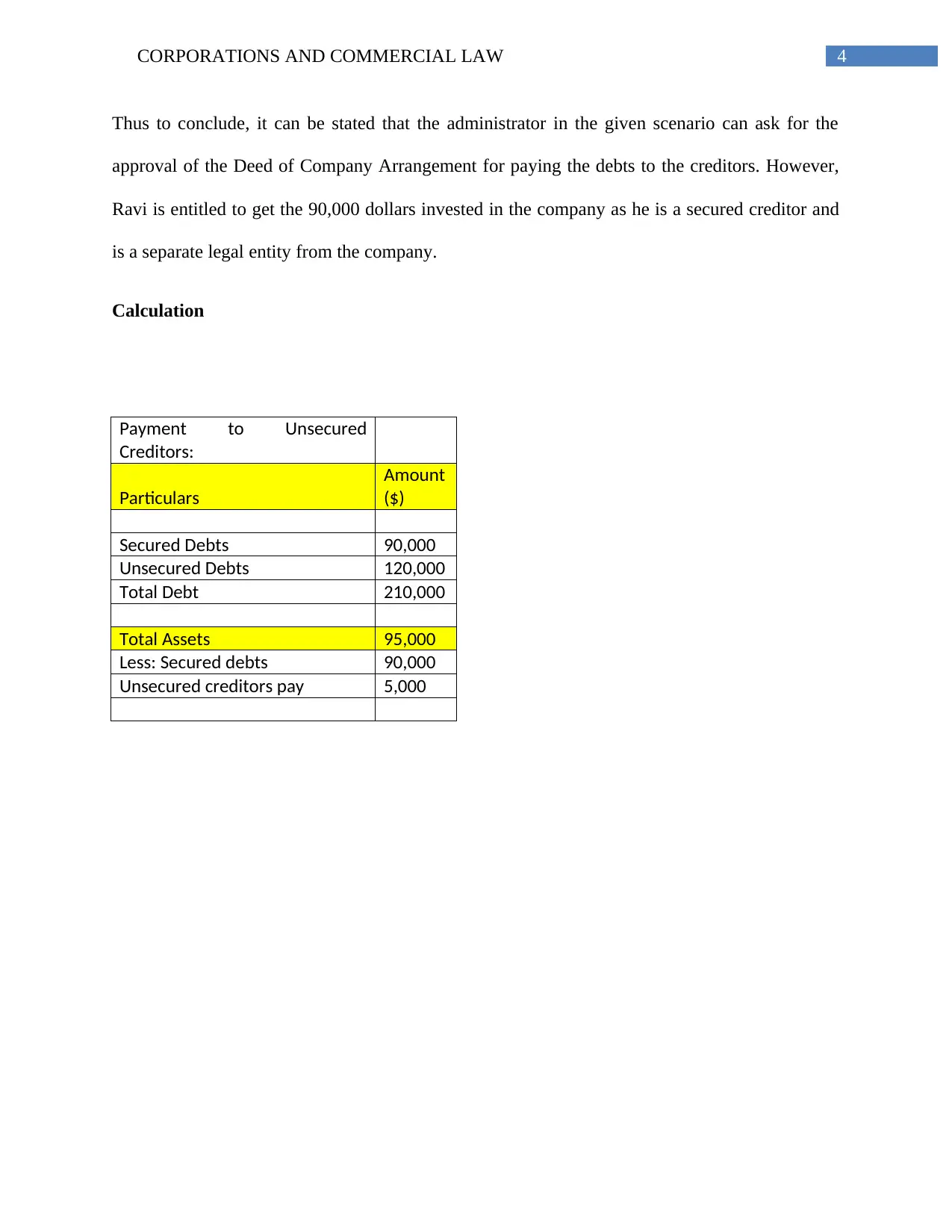
4CORPORATIONS AND COMMERCIAL LAW
Thus to conclude, it can be stated that the administrator in the given scenario can ask for the
approval of the Deed of Company Arrangement for paying the debts to the creditors. However,
Ravi is entitled to get the 90,000 dollars invested in the company as he is a secured creditor and
is a separate legal entity from the company.
Calculation
Payment to Unsecured
Creditors:
Particulars
Amount
($)
Secured Debts 90,000
Unsecured Debts 120,000
Total Debt 210,000
Total Assets 95,000
Less: Secured debts 90,000
Unsecured creditors pay 5,000
Thus to conclude, it can be stated that the administrator in the given scenario can ask for the
approval of the Deed of Company Arrangement for paying the debts to the creditors. However,
Ravi is entitled to get the 90,000 dollars invested in the company as he is a secured creditor and
is a separate legal entity from the company.
Calculation
Payment to Unsecured
Creditors:
Particulars
Amount
($)
Secured Debts 90,000
Unsecured Debts 120,000
Total Debt 210,000
Total Assets 95,000
Less: Secured debts 90,000
Unsecured creditors pay 5,000
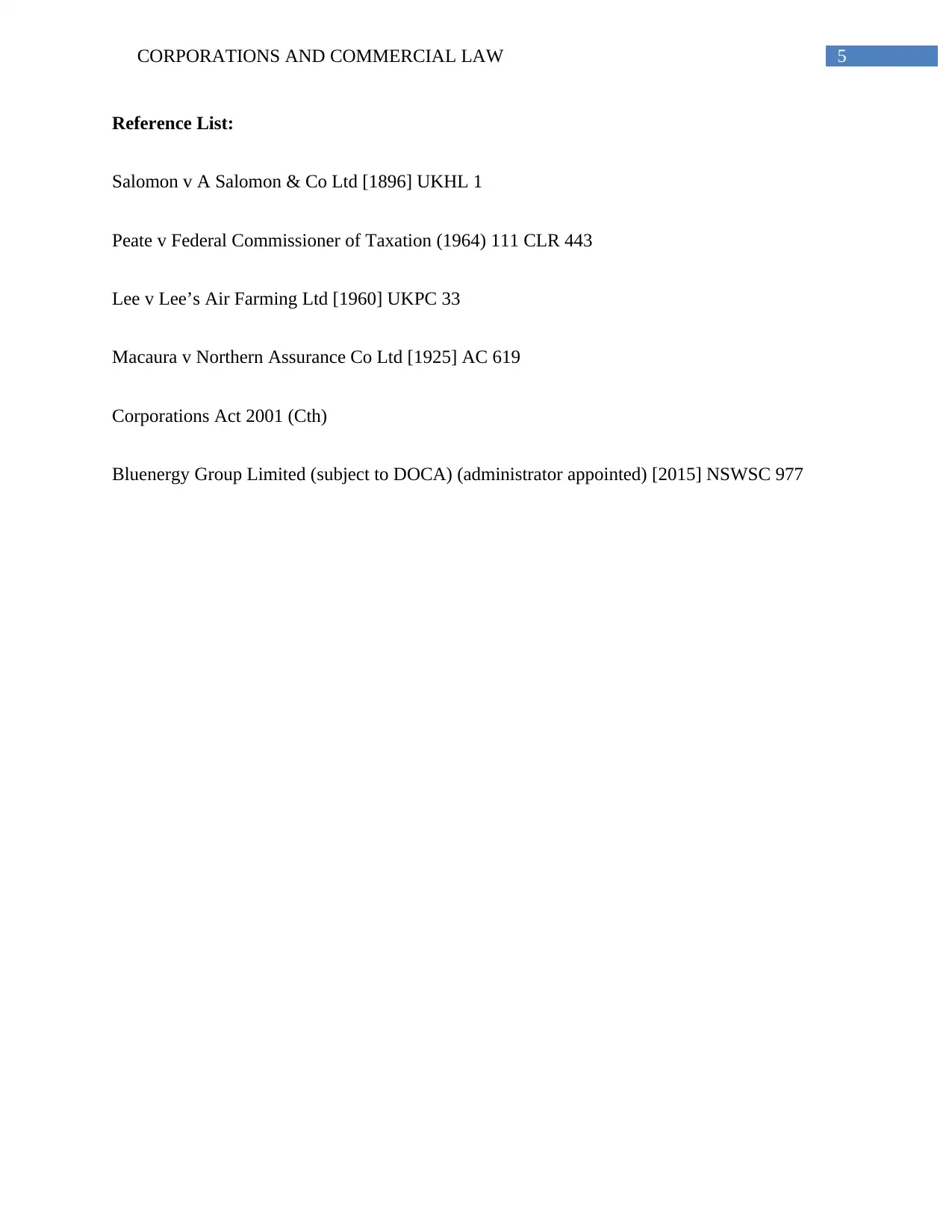
5CORPORATIONS AND COMMERCIAL LAW
Reference List:
Salomon v A Salomon & Co Ltd [1896] UKHL 1
Peate v Federal Commissioner of Taxation (1964) 111 CLR 443
Lee v Lee’s Air Farming Ltd [1960] UKPC 33
Macaura v Northern Assurance Co Ltd [1925] AC 619
Corporations Act 2001 (Cth)
Bluenergy Group Limited (subject to DOCA) (administrator appointed) [2015] NSWSC 977
Reference List:
Salomon v A Salomon & Co Ltd [1896] UKHL 1
Peate v Federal Commissioner of Taxation (1964) 111 CLR 443
Lee v Lee’s Air Farming Ltd [1960] UKPC 33
Macaura v Northern Assurance Co Ltd [1925] AC 619
Corporations Act 2001 (Cth)
Bluenergy Group Limited (subject to DOCA) (administrator appointed) [2015] NSWSC 977
⊘ This is a preview!⊘
Do you want full access?
Subscribe today to unlock all pages.

Trusted by 1+ million students worldwide
1 out of 6
Related Documents
Your All-in-One AI-Powered Toolkit for Academic Success.
+13062052269
info@desklib.com
Available 24*7 on WhatsApp / Email
![[object Object]](/_next/static/media/star-bottom.7253800d.svg)
Unlock your academic potential
Copyright © 2020–2025 A2Z Services. All Rights Reserved. Developed and managed by ZUCOL.




